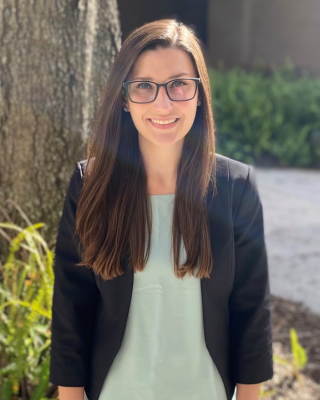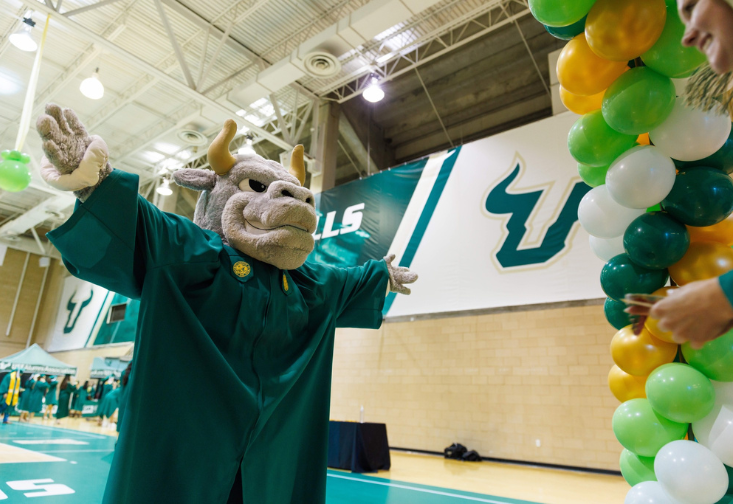A total of 258 students graduated during USF's Summer 2023 Commencement with degrees from the College of Behavioral and Community Sciences (CBCS). The commencement ceremonies included 93 students receiving undergraduate degrees, 159 students receiving master's degrees, and 6 students receiving doctoral degrees from CBCS.
Students graduating this semester represented the college's Department of Child and Family Studies, Department of Communication Sciences and Disorders, Department of Criminology, Department of Mental Health Law and Policy, School of Aging Studies, and School of Social Work.
We're happy to recognize a few outstanding students from this graduating class.

Marpessa Rietbergen
Master of Science in speech-language pathology
Marpessa Rietbergen earned her master’s degree in speech-language pathology and will graduate with over 700 clinical hours (and counting!) under her belt. Next up, Rietbergen says she will begin a one-year fellowship at the Miami Veterans Affairs (VA) Hospital starting in August. After that, she plans to earn her Certificate of Clinical Competence in Speech Language Pathology and begin working within the acute care/hospital sector as a SLP-CCC.
Rietbergen’s favorite course during her speech-language pathology education was Selected Topics: Medical SLP instructed by Alexandra Brandimore, PhD, CCC-SLP.
“I enjoyed this course because each lecture or topic was led by a speech-language pathologist who was currently working in that particular field or population,” said Rietbergen. “We also got the opportunity to administer a nasoendoscopy at the swallowing clinic!”
Rietgergen says she’ll miss study sessions in the breezeway of the PCD building on campus, as well as the instructors in the program.
“The Communication Sciences and Disorders instructors offer a wealth of information and expertise, and not having direct access to them will be challenging after graduation,” she said.
Her advice to a new student in the program?
“Follow your own path and do what feels right for you! If you don’t know, research, ask questions, and try things out. You have nothing to lose; you’re a student, and there to learn.”

Michael Reynolds
Master of social work
Graduation isn’t the only milestone Michael Reynolds will be celebrating this summer. In addition to earning his master’s degree in social work, he and his wife will welcome a baby soon after graduation! He says family will be his top priority during the next few months, but then he will pursue clinical licensure and seek out employment as a substance abuse counselor.
Reynolds’ favorite course during his program was an elective called Substance Use Disorders taught by Maayan Lawental, PhD, MSW which he says addressed everything from evidence-based treatment modalities to strategies for policy change.
“In many ways, this course embodied the social worker ethos by examining biases, exploring effective and ethical interventions, and advocating for a stigmatized population,” said Reynolds. “Dr. Lawental’s teaching encouraged me to accept an internship with the drug treatment court programs.”
Reynolds says that his experience with the drug court programs have been very impactful, and he looks forward to remaining in this field as a substance abuse counselor.
“The work of empowering and advocating on behalf of clients is central to what social workers do every day, and it is very rewarding to help these court participants build a brighter future," he said.
As he approached graduation, Reynolds said he will miss the consistent interactions with classmates and other interns that he enjoyed during his time as a USF student.
“They were constantly supportive, especially when I felt overwhelmed by the conflicting responsibilities of school, employment, and a field placement," said Reynolds. "Fortunately, I’m sure that we will find ways to stay in touch for years to come, and I know that the mutual support will continue.”
His advice to a new student in the program?
“Don’t spend too much time worrying about what you don’t know yet, and don’t be afraid to ask questions. Throughout my MSW experience, I regularly felt uncertain about my understanding and my capabilities,” said Reynolds. “However, there was always someone there to address my many questions and to guide me along. In short, give yourself space to grow, because you’re capable of more than you might expect.”

Monica Nelson
Doctorate in aging studies
Monica Nelson, who earned her doctorate in aging studies, will continue her career with a post-doctoral research fellowship in cognitive aging and Alzheimer's disease inequalities at the University of Michigan this fall.
"I intend to pursue a research-exclusive career focused on cognitive and brain aging to further understand reasons for discrepancies between biological markers for Alzheimer’s disease and the clinical manifestation of dementia," said Nelson.
Nelson says that one of her favorite parts of research is working with data and seeing what patterns emerge among the variables being studied. For this reason, she particularly enjoyed taking two advanced statistics courses: Multivariate Statistics in Aging taught by Brent Small, PhD and Statistical Analysis in Education Research III taught by John Ferron, PhD in the College of Education.
"Both of these courses provided me with knowledge needed to conduct and interpret many of the statistical analyses I use in my research and will be invaluable as I progress in my career," said Nelson.
While at USF, Nelson was awarded the Presidential Fellowship, which allowed her to have protected time for research and contributed to her productivity in the aging studies program. Nelson will graduate having contributed to 12 publications, including four that appeared in peer-reviewed journals with Nelson as first author. With the assistance of the Presidential Fellowship, she traveled to Prague, Czech Republic, and presented a talk on her work to the Czech Brain Aging Study research team and discussed projects with them as an international collaborator.
Nelson also secured an F31 Predoctoral Ruth L. Kirschstein National Research Service Award from the National Institute on Aging that supported her dissertation, "Contribution of Contextual Factors and Neuropathology to Dementia." The grant was initially developed during the Grant Writing Seminar taught by Brent Small, PhD, who also served as the sponsor on the project.
“I will miss the people in my department the most. The School of Aging Studies is a small, close-knit, collaborative community that was extremely supportive during my time as a student," said Nelson. "I will always value the connections I made while at USF and will miss my friends and colleagues from the program.”
Her advice to a new student in the program?
"My advice to a new student starting in my program would be to (1) seek out diverse opportunities, (2) be organized, and (3) strive for balance."

Katelyn Smith
Master of Arts in criminology
Katelyn Smith earned a master’s degree in criminology, but after turning her tassel she won’t be going far! Smith will be returning to the Department of Criminology at USF to pursue her doctoral degree.
“I’m really excited to keep working with the talented faculty in our department,” said Smith. “My favorite thing about the department is the collegiality. Faculty and students are always willing to help or collaborate in projects. It creates a great learning environment, and I am very thankful for it.”
Smith says she enjoyed all of the courses in the master’s program, but her favorite was the Surveyor course taught by George Burruss, PhD, which was modeled after the reality show “Survivor” and used gamification to enhance the learning experience.
“I learned so much in that course and came away with a great dataset that I later used to write my thesis,” said Smith. “I took the highest level statistical course offered in our program, also with Dr. Burruss, to learn more advanced tests to be able to test the theory I was using. It produced great results and ultimately ended up being a project I am very proud of.”
Her advice to a new student in the program?
“Don’t be afraid of failing at new things or getting something wrong. Grad school is all about learning to be an independent scholar, and so much of that learning happens when you push yourself to try new things. Make sure to be nice to yourself when things don't work the first time.”

Dereka Graham
Bachelor of Science in behavioral healthcare
Dereka Graham earned her bachelor's degree in behavioral healthcare while also working full time as a behavioral health technician on the inpatient psychiatric unit at the VA. Her work included assisting the medical team with caring for veterans with various mental health and substance use disorders. Graham has military experience herself, serving for six years in the Florida Army National Guard as an ammunition supply specialist.
“One accomplishment I am proud of is making the dean’s list a few semesters in a row. It was not easy while working a full-time job at the VA, but I was intentional about my educational success, and I am now graduating with honors,” said Graham.
She says Multidisciplinary Behavioral Healthcare Services led by Michael Dow, PhD was one of her favorite courses in the program because it helped her find her path of clinical psychology.
“Every professor I’ve had was great, accessible, and willing to help when needed," Graham said. "This program is set up to help you become a great behavioral healthcare professional.”
Graham has been accepted into a clinical psychology program at the Florida School of Professional Psychology at National Louis University and says she hopes to continue working with veteran populations at VA hospitals.
Her advice to a new student in the program?
“Soak up all the valuable information you will receive. The field of behavioral healthcare is broad and there are various paths one can take. Be intentional with your goals and what you want to gain from the program. There is a lot of information that will be provided and many tools to take away; use them to go the path that is best for you.”

Alyssa Hanley
Master of Science in child and adolescent behavioral health
Alyssa Hanley graduated with a master’s degree in child and adolescent behavioral health with a concentration in developmental disabilities. She says her favorite courses in her program were Addressing Behavior Challenges in Young Children and Intensive Individualized Positive Behavior Support.
“These courses provided me with a lot of knowledge and skills that I use in my everyday life as a [registered behavior technician] and while working in schools,” said Hanley. “These classes greatly impacted my ability to serve the children I work with.”
She says that she is most proud of her thesis project, which was on the impact of COVID-19 on service access for youth with intellectual and developmental disabilities. While it was challenging, Hanley says she learned a lot and felt supported throughout the process.
“I enjoyed the support from professors and staff and also from the other students,” she said. “Being online, it can be hard to form a relationship with others in your program and with faculty, but everyone I interacted with throughout the program was very supportive and always willing to help.”
Hanley’s long-term goal is to earn a doctoral degree in school psychology and continue to work with and support children.
Her advice to a new student in the program?
“It can be challenging at times, but there is so much support at USF. Reach out for help when you need it!”
